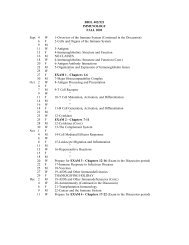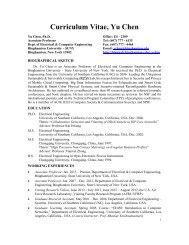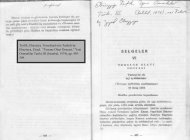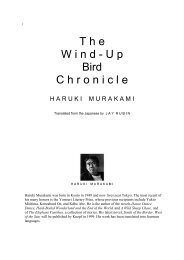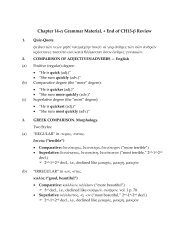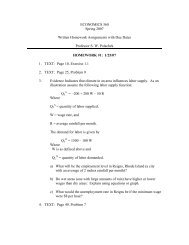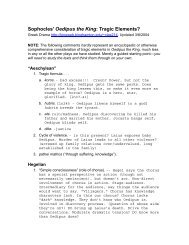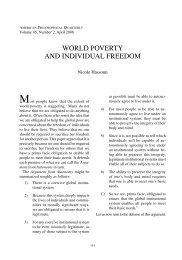Aristotle Poetics - Harvey.binghamton.edu
Aristotle Poetics - Harvey.binghamton.edu
Aristotle Poetics - Harvey.binghamton.edu
You also want an ePaper? Increase the reach of your titles
YUMPU automatically turns print PDFs into web optimized ePapers that Google loves.
<strong>Aristotle</strong> <strong>Poetics</strong> 22<br />
things or not, his art as a poet is never seriously criticized on that account. What fault can<br />
one see in Homer’s “Sing of the wrath, Goddess”—which Protagoras has criticized as<br />
being a command where a prayer was meant, since to bid one do or not do, he tells us, is<br />
a command. Let us pass over this, then, as appertaining to another art, and not to that of<br />
poetry.<br />
[Sections 20–25 we shall not be reading.]<br />
26<br />
10<br />
20<br />
30<br />
The question may be raised whether the epic or the tragic is the higher form of imitation.<br />
It may be argued that, if the less vulgar is the higher, and the less vulgar is always that<br />
which addresses the better public, an art addressing any and every one is of a very vulgar<br />
order. 84 It is a belief that their public cannot see the meaning, unless they add something<br />
themselves, that causes the perpetual movements of the performers—bad pipe-players,<br />
for instance, rolling about, if discus-throwing is to be represented, or mauling the chorus<br />
leader (koruphaios), if Scylla is the subject of the piece. 85 Tragedy, then, is said to be an<br />
art of this order—to be in fact just what the later actors were in the eyes of their predecessors.<br />
For Myrmiscus used to call Callippides “the ape” because (he thought) Callippides<br />
overacted his parts; and a similar view was taken of Pindar also. All tragedy, however, is<br />
said to stand to the epic as the newer to the older school of actors. The former, accordingly,<br />
is said to address a cultivated audience, which does not need the accompaniment of<br />
gesture; the latter, an uncultivated one. If, therefore, tragedy is a vulgar art, it must clearly<br />
be lower than the epic. 86<br />
The answer to this is twofold. In the first place, one may urge (1) that the censure does<br />
not touch the art of the dramatic poet, but only that of his interpreter. For it is quite possible<br />
to overdo the gesturing even in an epic recital, as did Sosistratus, and in a singing<br />
contest, as did Mnasitheus of Opus. (2) That one should not condemn all movement,<br />
unless one means to condemn even the dance, but only that of ignoble people—which is<br />
the point of the criticism passed on Callippides and in the present day on others, that their<br />
women do not resemble reputable women. (3) That tragedy may produce its effect even<br />
without movement or action in just the same way as Epic poetry. For from the mere reading<br />
of a play its quality may be seen. So that, if it be superior in all other respects, this<br />
element of inferiority is not a necessary part of it.<br />
In the second place, one must remember (1) that tragedy has everything that the epic has<br />
(even the epic meter being admissible), together with a not inconsiderable addition in the<br />
shape of the music (a very real factor in the pleasure of the drama) and the spectacle. (2)<br />
84 <strong>Aristotle</strong> defends tragedy against the charge that it is more vulgar than epic.<br />
Athenian tragedy could be open to that charge because it was designed for performance<br />
before a mass audience. Epic too was performed before mass audiences at Athens, though<br />
less often than drama.<br />
85 Timotheus’ Scylla is a dithyramb (above note 4) concerning the monster Scylla,<br />
who devoured some of Odysseus’ crew.<br />
86 It was typical in ancient Greece to regard the older as better than the newer.



